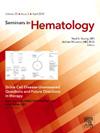Report of Consensus Panel 1 from the 12th International Workshop on the management of patients with IgM and Waldenstrom's Macroglobulinemia related neuropathy
IF 4.1
3区 医学
Q1 HEMATOLOGY
引用次数: 0
Abstract
The IgM-related peripheral neuropathies (IgM-PN) are a group of chronic disorders characterized by the presence of monoclonal IgM that may be associated with one of several diseases affecting the peripheral nerves. In many cases, there is a monoclonal IgM associated with activity against neural targets, leading to progressive peripheral nerve demyelination. Neurological symptoms in this setting can also result from direct invasion of the peripheral or central nervous system by lymphoplasmacytic cells (neurolymphomatosis and Bing-Neel syndrome respectively) or via other mechanisms (for example AL amyloid deposition or cryoglobulinemic vasculitis). There is an expanding array of treatment options, but high-quality data are sparse. Diagnostic accuracy is important and needs collaboration between hematologists and neuromuscular specialists to determine the sequence and intensity of investigations. Appropriate causal attribution to the IgM disorder is essential to enable the correct therapeutic intervention. The aims of treatment intervention should be clear and realistic. Consistent and clinically meaningful measures are needed to capture treatment success. Despite therapeutic advances, many patients experience persistent disability, highlighting the need for further research.
第12届IgM和Waldenström巨球蛋白血症相关神经病变患者管理国际研讨会共识小组1报告
IgM相关周围神经病变(IgM- pn)是一组以单克隆IgM存在为特征的慢性疾病,可能与影响周围神经的几种疾病之一有关。在许多情况下,单克隆IgM与针对神经靶点的活性相关,导致进行性周围神经脱髓鞘。在这种情况下,神经系统症状也可由淋巴浆细胞(分别为神经淋巴瘤病和Bing-Neel综合征)直接侵入周围或中枢神经系统或通过其他机制(例如AL淀粉样蛋白沉积或冷球蛋白性血管炎)引起。治疗选择越来越多,但高质量的数据却很少。诊断的准确性很重要,需要血液学家和神经肌肉专家之间的合作来确定检查的顺序和强度。对IgM障碍进行适当的因果归因对于正确的治疗干预至关重要。治疗干预的目标应该是明确和现实的。需要一致和有临床意义的措施来获得治疗成功。尽管治疗取得了进步,但许多患者经历了持续的残疾,这突出了进一步研究的必要性。
本文章由计算机程序翻译,如有差异,请以英文原文为准。
求助全文
约1分钟内获得全文
求助全文
来源期刊

Seminars in hematology
医学-血液学
CiteScore
6.20
自引率
2.80%
发文量
30
审稿时长
35 days
期刊介绍:
Seminars in Hematology aims to present subjects of current importance in clinical hematology, including related areas of oncology, hematopathology, and blood banking. The journal''s unique issue structure allows for a multi-faceted overview of a single topic via a curated selection of review articles, while also offering a variety of articles that present dynamic and front-line material immediately influencing the field. Seminars in Hematology is devoted to making the important and current work accessible, comprehensible, and valuable to the practicing physician, young investigator, clinical practitioners, and internists/paediatricians with strong interests in blood diseases. Seminars in Hematology publishes original research, reviews, short communications and mini- reviews.
 求助内容:
求助内容: 应助结果提醒方式:
应助结果提醒方式:


